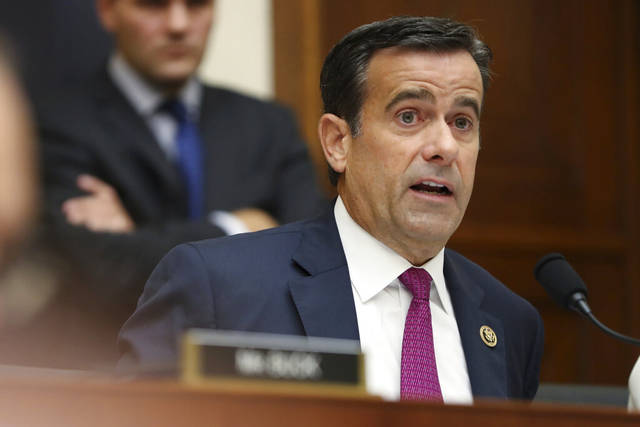Trump’s spy chief pick, John Ratcliffe, accused of fudging role in ‘Holy Land’ terrorism case
WASHINGTON — The Republican congressman picked by President Trump to be America’s next intelligence chief is grappling with reports that he embellished his role in a high-profile anti-terrorism case he’s cited as proof of his national security bona fides.
At issue is the extent of Texas Rep. John Ratcliffe’s involvement as a federal prosecutor in the U.S. v. Holy Land Foundation case, which ended in 2009 with officials at a Texas-based charity being found guilty of funneling money to the terrorist group known as Hamas.
While Ratcliffe has touted that he “convicted individuals” involved in the scheme, ABC News and NBC News this week cast doubt on that account.
ABC News reported that it could find no public court records connecting him to the two trials involved in the case and that officials involved in the proceedings did not recall him having a role. NBC News more broadly disputed that Ratcliffe, as he put it, “put terrorists in prison.”
Jim Jacks, one of the Holy Land case’s lead prosecutors, also told The Dallas Morning News on Tuesday that Ratcliffe “wasn’t part of the trial team or the investigative team.” Asked if it was accurate to say that Ratcliffe “convicted individuals” in the case, he said, “No.”
For everyone who's too busy to look into @KenDilanianNBC's report on Ratcliffe's false claim that he "put terrorists in prison," Note: He claimed this on his CONGRESSIONAL website (not a campaign website). Also see the claim that he "arrested 300 illegal aliens in a single day." pic.twitter.com/0iTtOgqStw
— Michael S. Smith II (@MichaelSSmithII) July 30, 2019
In response to those reports, Ratcliffe spokeswoman Rachel Stephens clarified this week that the Texan, while serving as U.S. attorney for the Eastern District of Texas, was appointed to investigate issues related to the mistrial that occurred in the case’s first trial.
“Because that investigation did not result in any criminal charges, it would not be in accordance with Department of Justice policies to make further details public,” she said, confirming a written statement provided to ABC News and NBC News.
Jacks, a former U.S. attorney in the Northern District of Texas, confirmed that depiction, explaining that Ratcliffe was “appointed to look into a collateral matter after the first trial” and that the assignment lasted for a “relatively short-lived period of time.”
He added that he found Ratcliffe to be “very smart, a very good lawyer, just first-rate.”
The dispute over the Holy Land case is no mere résumé dispute.
Ratcliffe, a three-term lawmaker, was already facing criticism that he lacks the experience to be Director of National Intelligence, given that outgoing spy chief Dan Coats and his predecessors came into the job with extensive national security and foreign affairs backgrounds.
That dynamic, along with Ratcliffe’s standing as a Trump loyalist, could jeopardize his confirmation in the GOP-run Senate.
Some key Republican senators have so far offered muted reactions, with a few admitting that they were simply unfamiliar with Ratcliffe’s credentials. Some top Senate Democrats have already weighed in against Ratcliffe’s nomination, casting him as a partisan warrior unfit for the job.
Sen. Mark Warner on Ratcliffe: "I'm gravely concerned. When it appears that the president is trying to look for someone who will be a political loyalist rather than that independent voice standing up for the intelligence community." pic.twitter.com/0wDzogqLLP
— The Hill (@thehill) July 30, 2019
Several intelligence officials have also made clear their unease.
“Mr. Ratcliffe appears to be somebody who is more interested in pleasing Donald Trump,” John Brennan, CIA director under President Barack Obama and a frequent Trump critic, said this week on MSNBC.
Stephens rejected those criticisms, pointing to Ratcliffe’s experience as a federal prosecutor and then as a congressman serving on the House intelligence and judiciary committees.
“Ratcliffe opened, managed and supervised numerous domestic and international terrorism related cases,” she said of his time in the U.S. attorney’s office, adding that he “handled top-secret, secret and confidential national security information as part of his daily responsibilities.”
Ratcliffe’s allies have also defended his qualifications.
Texas Sen. John Cornyn on Monday called Ratcliffe a “worthy successor” to Coats, upon whom he heaped praise. Trump on Tuesday hailed Ratcliffe as a “very talented guy.” And former U.S. Attorney Matt Orwig, who hired Ratcliffe, said he was “imminently qualified.”
.@SecPompeo on John Ratcliffe: "He is very smart. I'm very confident he'll do a good job." #ECWPompeo pic.twitter.com/Vd7WNbBYwT
— CSPAN (@cspan) July 29, 2019
Orwig sought to further buttress Ratcliffe’s standing by telling ABC News that his onetime protégé worked several terrorism-related cases, though he declined to specify them.
The former top prosecutor in the Eastern District of Texas also told The News that when Ratcliffe served as his anti-terrorism and national security chief, he worked to “bring together all the state, federal and local agencies” involved in security efforts.
“That’s the job that he did,” Orwig said. “He did it very, very well.”
Remove the ads from your TribLIVE reading experience but still support the journalists who create the content with TribLIVE Ad-Free.

